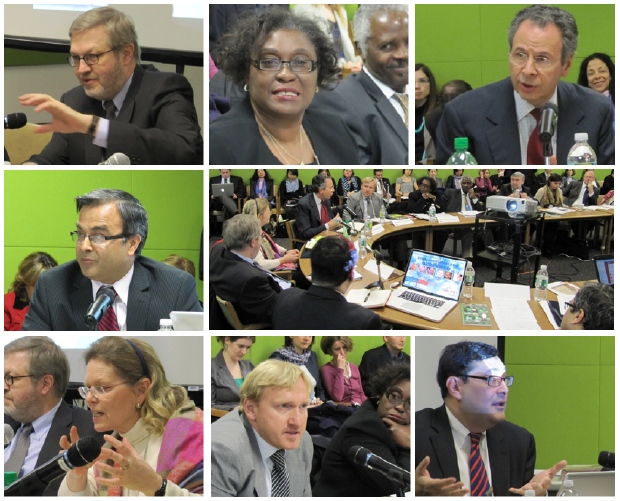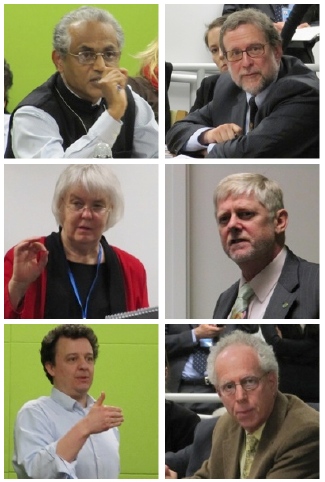Special Brainstorming Event at United Nations on Accountability and Implementation
The Frederick S. Pardee Center for the Study of the Longer-Range Future at Boston University co-hosted a special high-level brainstorming session on “Accountability and Implementation: The Keys to Sustainable Development” at the United Nations in New York on March 8, 2011, as a side-event at the second PrepCom meeting for the forthcoming 2012 Rio+20 conference (the United Nations Conference on Sustainable Development). The event was held with support from the Nordic UN Missions of Denmark, Finland, Iceland, Norway and Sweden, to the United Nations in New York. (See another report of the event here).

Amb. Carsten Staur, Permanent Representative to the United Nations, Denmark, chaired the session. He welcomed participants and noted that everyone agrees that accountability is very important. However, he stressed, the key question is how to achieve it. He defined the objective of the session as a brainstorming exercise to help provide responses to that question.
The brainstorming session was attended by senior diplomats, nongovernmental experts, and scholars. During the event, a background paper was introduced by Prof. Adil Najam (Director, Pardee Center, Boston University). An invited panel responded to the paper, and together with the public, proposed new and innovative ideas on how to make accountability and implementation a more prominent focus within global environmental governance, particularly in the discussions leading up to the Rio+20 conference.

Amb. Irene Freudenschuss-Reichl, Director General for Development Cooperation, Austria, described her experiences on accountability in the development world, outlining useful examples such as “peer-review” processes in OECD and Africa. She highlighted the importance of mutual accountability based on a joint definition of development goals. Noting that too many reports are written, she stressed the need for better reports, not more reports.
André Aranha Corrêa do Lago, Ministry of External Relations, Brazil, said the conceptual richness of sustainable development makes sense for developing countries. While developed countries got rich first, then addressed social issues and then the environment, he said, developing countries must contend with all three issues at the same time, not by choice but by necessity. He stressed that international accountability must be built upon national accountability and legitimacy, and proposed that in addition to a compendium of “best practices,” a compendium of “bad practices” could also be useful.
Dr. Asad Khan, Vice Chair of Rio+20 Bureau and Ministry of Foreign Affairs, Pakistan, said implementation and accountability are a recurrent theme at the United Nations. He said pursuing legally-binding agreements is not a solution to accountability, as those agreements go unimplemented as well. He underscored several causes for non-implementation, including lack of capacity, lack of ownership, lack of political will by government or political power by the would-be national implementing body, and cultural impediments. He reminded the public about the Annual Ministerial Review and Development Cooperation Forum.
Dr. Bradnee Chambers, Chief of Policy, Division of Environmental Law and Conventions, UNEP, noted that most MEA’s are being complied with because they only contain marginal commitments. He noted the lack of review mechanisms, and stressed that without review, there is no accountability. He underscored ongoing work at UNEP on reporting methodologies and collaboration with the Supreme Audit organizations, while stressing the political sensitivity of the issue because of the perceived impingement on sovereignty and frictions with other UN agencies.
Sen. Elizabeth Thompson, Executive Coordinator for Rio+20 and former Minister of Energy and Environment, Barbados, stressed that MEAs have created a culture of negotiation not related at all to actual implementation. She underscored the importance of having a legacy objective for Rio+20. She said involving constituencies is key for accountability, as they can provide external feedback. Noting that the UN feels good about talking and having meetings, which actually do not change the lives of people in the streets, she concluded her remarks by noting: “we’ve just had another meeting.”
During the discussion with the public, several ideas were raised, including on self-reporting and why it creates asymmetrical conditions for developed and developing countries, the importance of metrics and data collection, the role of long negotiations as a learning process, and putting negotiators to “better use.”
The event was attended by a packed room (standing room only) of senior diplomats, civil society leaders, policy practitioners and scholars from around the world. It was also covered via ‘Live Tweets’ at the Pardee Center Twitter feed.
This event was the launching point of a larger project on accountability and implementation and building upon the discussion at this event, the Pardee Center will be developing a policy paper on the subject. The Nordic Missions of Denmark, Finland, Iceland, Norway and Sweden have generously supported this independent academic exercise, but this support does not necessarily signify any policy endorsement of the ideas discussed or emerging from the exercise.
The event itself built upon a set of earlier Pardee Center activities related to Accountability (a public seminar and an experts workshop on the subject were held at the Pardee Center in September 2010, based on an earlier Pardee Center policy paper). The Pardee Center has also been very active in the global discussions around Rio+20 and launched its new Task Force Report on ‘Governance for a Green Economy’ at this PrepCom (also here and here). This added to a 2009 Pardee Center policy paper on Rio+20. In addition, Prof. Adil Najam, Pardee Center Director, has spoken frequently at the United Nations at Rio+20 related discussions, especially those pertaining to institutional and governance challenges (here, here and here). This was the third Pardee Center hosted event at the United Nations, and followed on side events organized by the Boston University Pardee Center at the 2009 UN CSD and the 2010 UN CSD meetings.